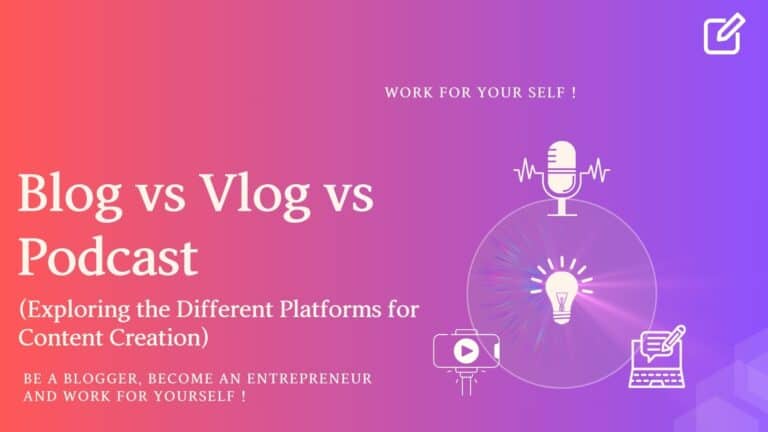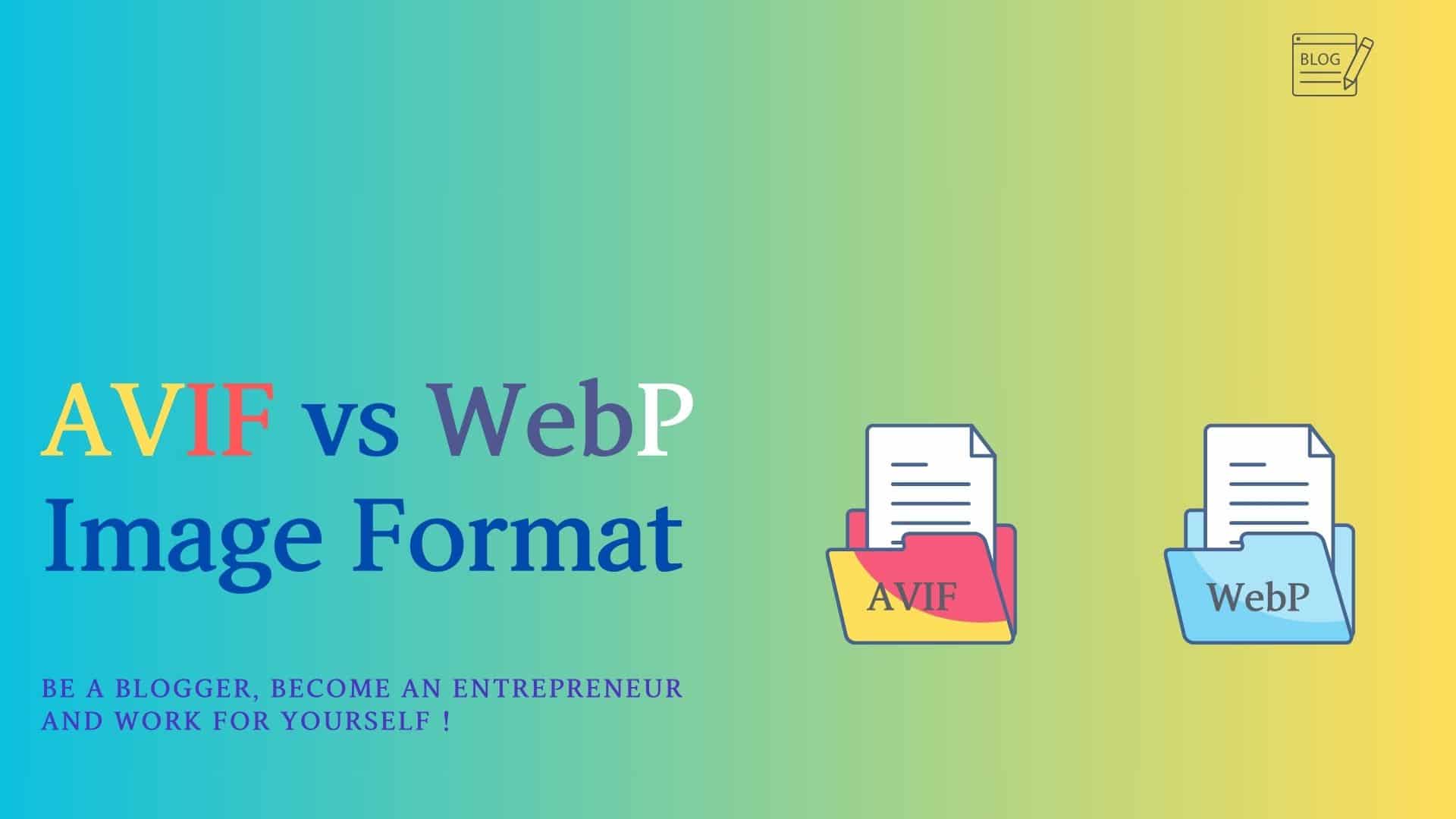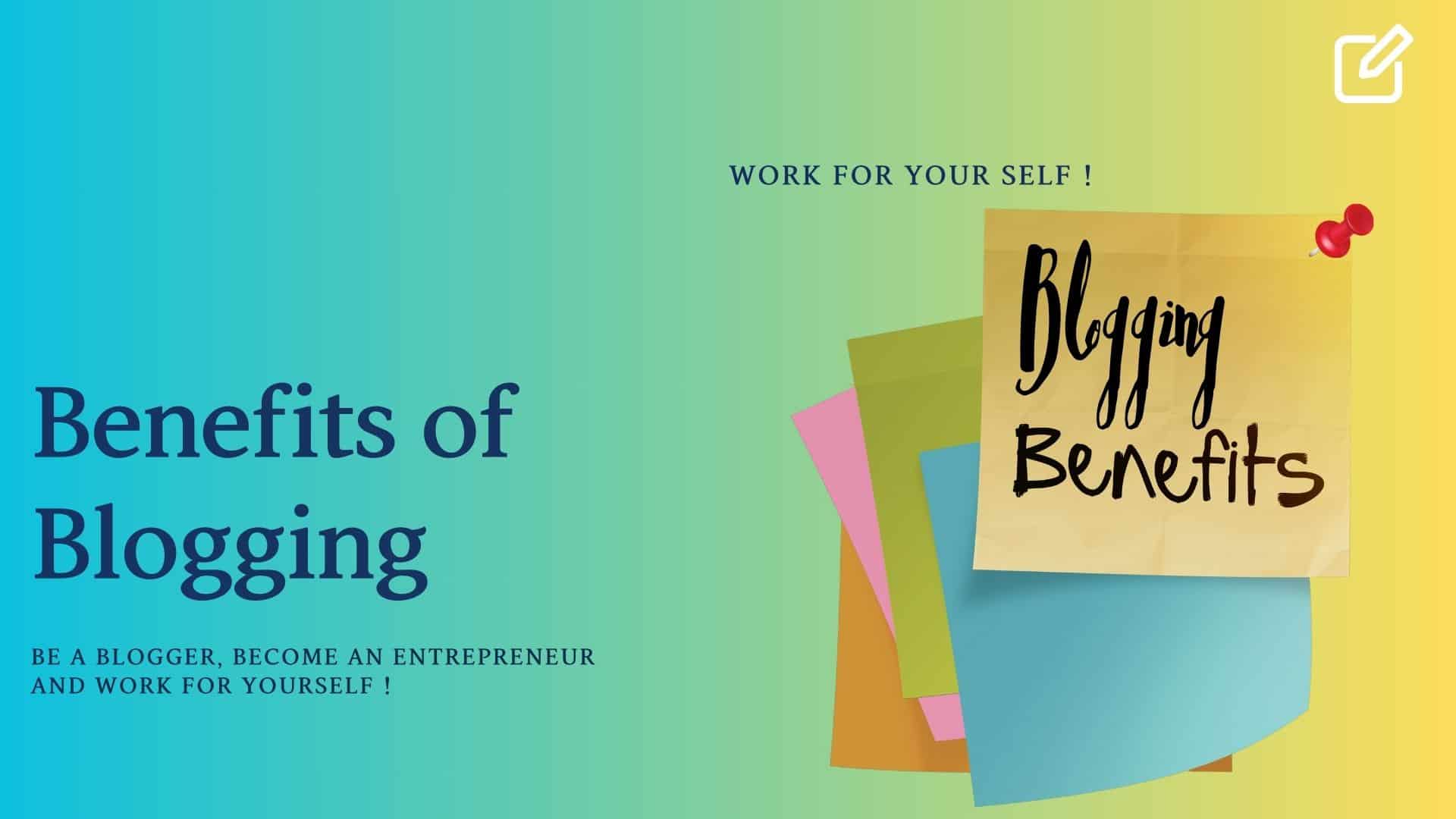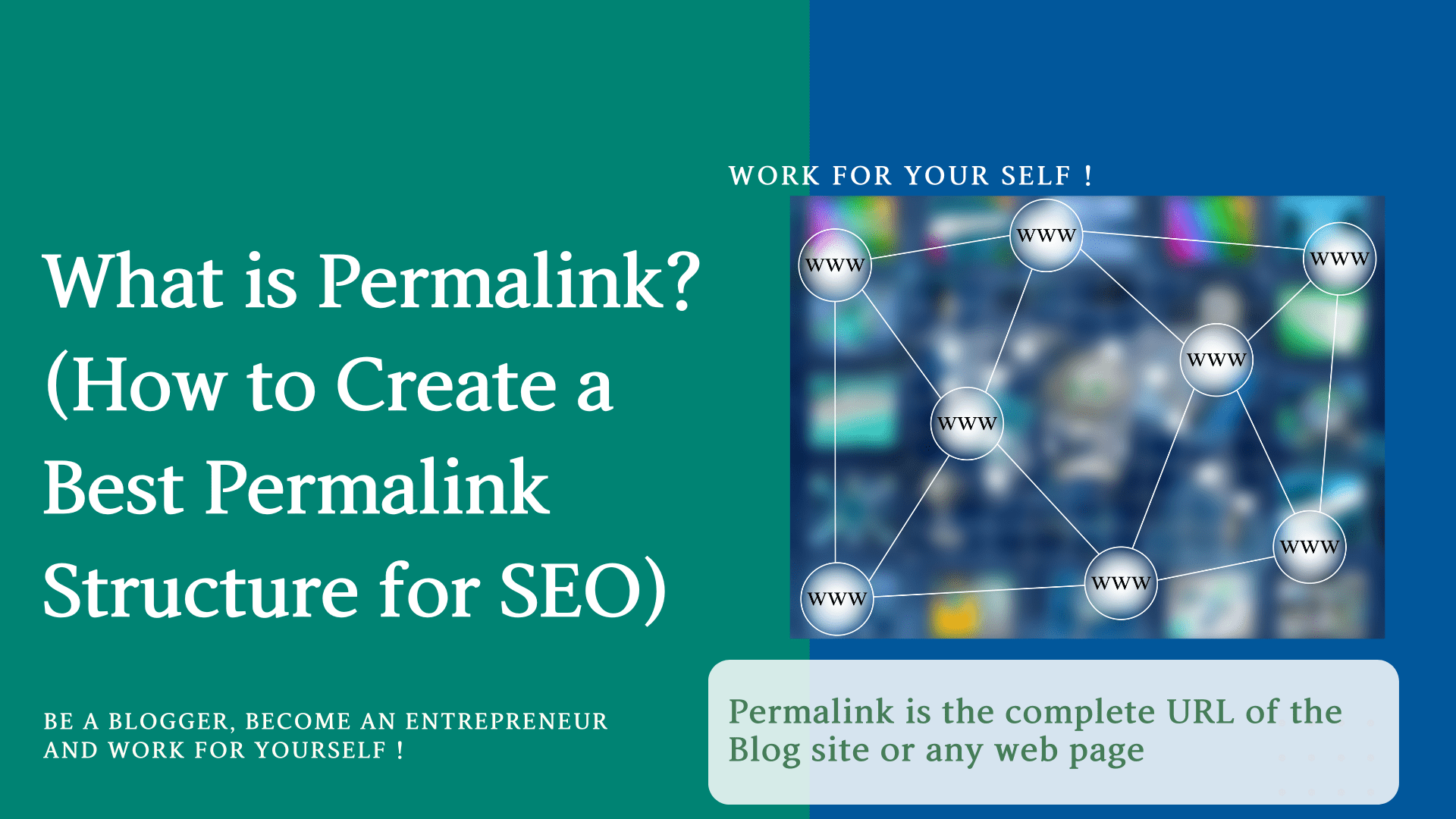Are you planning to start a blog or Vlog or Podcast? Wondering what type of content is best for you? In this guide, we will cover the basics of blog vs vlog vs podcast and how they differ interestingly.
Let’s take each separately and then understand the difference between blog, vlog, and podcast.
Let’s Start with Blogging
Table of Contents
ToggleWhat is Blogging?

Blogging is writing and publishing content on a website, typically in articles or blog posts.
It allows individuals or businesses to share their thoughts, experiences, expertise, and information with their audience or readers.
Blogs can cover many topics, including personal experiences, hobbies, travel, fashion, food, technology, and more.
Advantage of Blogging
There are several advantages of blogging:
1. Expression and Creativity: Blogging allows individuals to express their thoughts, ideas, and creativity.
It allows you to share your passions, experiences, and expertise with a broader audience.
2. Building an Online Presence: By consistently creating and sharing valuable content, you can attract readers and build loyal followers.
It helps you establish an online presence.
3. Knowledge Sharing: Blogging allows you to share your knowledge and expertise with others.
You can help others learn and grow from your insights.
4. Networking and Collaboration: Blogging can open doors to networking opportunities and collaboration with other bloggers and influencers in your industry.
5. Monetization Potential: A successful blog can be monetized through various methods, such as advertising, sponsored content, affiliate marketing, and selling products or services.
It can become a source of passive income or even a full-time career.
6. SEO Benefits: Blogging helps improve your website’s search engine optimization (SEO).
By consistently publishing valuable and relevant content, you increase the chances of your blog appearing in search engine results, driving organic traffic to your website.
So, as blogging has benefits, there are some challenges, too. Let’s check that.
Challenges of Blogging
Certainly! Here are some of the challenges commonly faced by bloggers:
1. Finding the right topic and niche: As a beginner, you can struggle while choosing a topic or niche for your blog.
Narrowing down your blog’s focus and identifying a specific target audience is essential.
2. Time management: Blogging requires consistent effort and time commitment. Creating a blog, promoting it, and engaging with readers demands your time.
3. Building an audience: If you create high-quality and valuable content, promote your blog correctly through social media, and engage with your readers, this will help you build a loyal blog audience.
4. SEO complexity: Understanding and implementing effective search engine optimization (SEO) strategies can be challenging.
Investing in SEO training or using SEO tools can help overcome this challenge.
5. Monetization: While monetizing a blog has potential, generating a steady income alone can be challenging.
For this, we can get help from collaborators and affiliates.
Now let’s move to Vlogging.
What is Vlogging?

Vlogging is video blogging, which involves creating and sharing videos on various platforms such as YouTube, Instagram, or TikTok.
Vloggers typically document their lives, share their experiences, or provide information on a specific topic through videos.
Vlogging allows creators to engage with their audience more dynamically and visually than traditional blogging.
Advantage of Vlogging
Vlogging offers several advantages that benefit both vloggers and viewers. Here are some of the key advantages:
1. Broader reach: Vlogging allows content creators to reach a wider audience.
Videos have the potential to be shared and discovered by viewers from around the world.
2. Direct engagement: Vlogging enables direct engagement and interaction with the audience.
Here, viewers can comment, ask questions, and give feedback. Vloggers can respond and build a personal connection.
3. Information sharing: Vlogging provides a platform for vloggers to share information, knowledge, and expertise on different topics.
It may be tutorial, personal experiences, or educational content.
4. Entertainment: Adding some creativity, vloggers can make videos more enjoyable and provide a good source of entertainment for their viewers.
5. Monetization potential: Vlogging can be a source of income for content creators who consistently produce high-quality and engaging videos.
You can earn money through various methods like brand partnership, sponsored content, and affiliate marketing.
Challenges of Vlogging
While vlogging can be a rewarding experience, it can also entail some challenges for vloggers. Here are some challenges that vloggers might face:
1. Consistency: Vloggers must produce high-quality videos regularly to keep viewers engaged.
This can be challenging because consistently creating content requires time, effort, and dedication.
2. Competition: Nowadays, Vlogging is popular. Due to this competition, higher Vloggers must stand out by creating unique and high-quality content and developing their brand.
3. Equipment and Technical Knowledge: To create a good and high-quality video, you require a good camera, microphones, and editing tools.
Vloggers must also have technical knowledge to operate the equipment and editing software.
Sometimes, this can be challenging because new equipment and software can be expensive.
4. Creative Block: Vloggers may face creative blocks and struggle to develop fresh content ideas or find themselves repeating content themes.
5. Negative Comments and Trolls: Vloggers may face negative comments or harsh criticism from viewers.
Now let’s understand what is a Podcast.
What is Podcast?
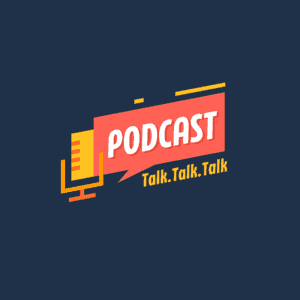
Podcast is a term that refers to a series of audio or digital episodes that are typically on a specific theme or subject.
It is a form of digital media that allows users to listen to or download episodes on their preferred devices, such as smartphones, tablets, or computers.
Podcasts cover various topics, including news, entertainment, education, sports, etc.
They are often hosted by individuals or teams who provide commentary, interviews, stories, or discussions about the chosen topic.
You can use podcast apps or platforms like Apple Podcasts, Spotify, Google Podcasts, or Stitcher to listen to a podcast.
These platforms allow users to subscribe to their favorite podcasts and receive automatic updates whenever new episodes are released.
Advantage of Podcast
Podcasts offer several advantages, some of which are:
1. Lower barriers to entry: Creating a podcast requires relatively low startup costs compared to other forms of media like television or radio.
2. Reach: Podcasts can potentially reach a global audience, and creators do not need to adhere to geographical limitations.
3. Niche topics: Podcasts allow creators to explore niche topics that may not be feasible in mainstream media.
4. Monetization: Creators can monetize their podcasts through sponsorships, advertisements, or crowdfunding.
Podcasts offer an engaging and convenient alternative to traditional media while providing opportunities for content creators to reach and engage with their audience.
Challenges of Podcasts
While podcasts have many advantages, some challenges are associated with creating and maintaining a successful podcast. Here are a few common challenges:
1. Competition: The podcasting space is becoming increasingly crowded, making it more challenging for new podcasts to stand out and attract listeners.
2. Technical expertise: Creating and editing audio content requires technical skills.
Learning the equipment, software, and editing techniques may take time to produce high-quality audio.
3. Consistency and scheduling: Maintaining a regular release schedule can be demanding.
It takes time and effort to produce and release episodes consistently, especially for long-running series.
4. Discoverability: With the abundance of podcasts available, getting discovered by potential listeners can be difficult.
Without effective marketing and promotion strategies, podcasts may struggle to gain visibility and build an audience.
5. Monetization: Generating revenue from podcasts can be challenging.
It typically requires building a significant audience before attracting advertisers or implementing monetization strategies like sponsorships, merchandise sales, or crowdfunding.
6. Technical issues: Podcasting platforms and hosting services may experience technical glitches that could impact the distribution and availability of episodes.
7. Long-term sustainability: Producing a podcast can be time-consuming and create constraints on resources and energy.
Maintaining motivation, consistently generating new content, and keeping listeners engaged can be challenging over the long term.
Key Differences-Blog vs Vlog vs Podcast
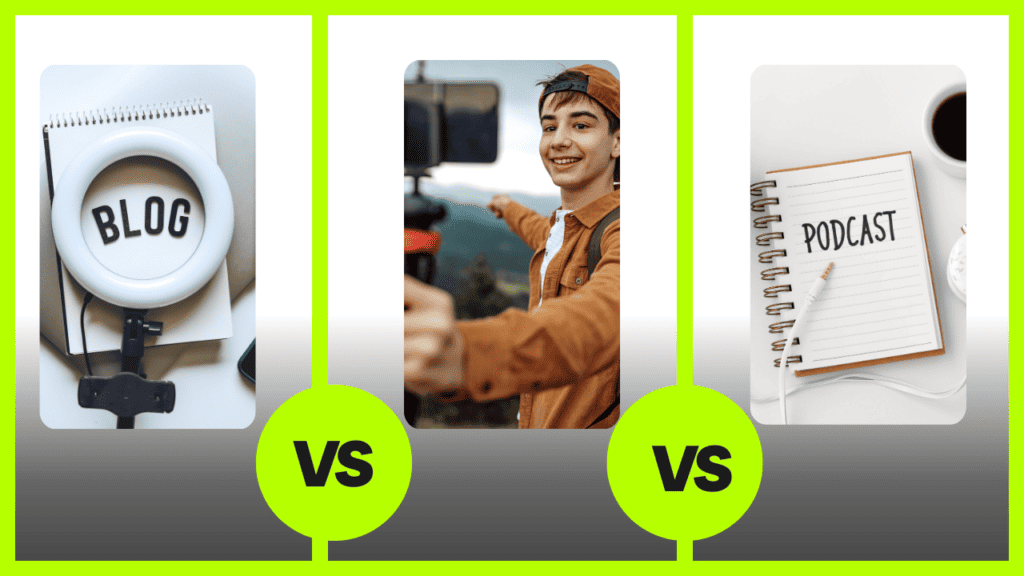
Blogs, vlogs, and podcasts are different forms of content creation with their features.
| BLOG | VLOG | PODCAST |
| A blog refers to a regularly updated website or online platform where an individual or a group of individuals share their thoughts, ideas, and information on various topics in a written format. | A vlog, short for a video blog, is a form of content creation where individuals share video content regularly. Vlogging enables direct engagement and interaction with the audience. | On the other hand, a podcast is an audio-based form of content typically delivered in an episodic series. Podcasts can cover various topics such as news, storytelling, interviews, education, and entertainment. |
| Blogs usually consist of written articles or blog posts and may include images, videos, and links to external resources. | Vlogs often have a personal and informal tone and can cover various topics, similar to blogs. | They can be subscribed to and downloaded by listeners, who can then listen to them at their convenience. |
| They are typically organized in reverse chronological order, with the latest post appearing at the top of the page. | Vlogs may include footage of the vlogger talking to the camera, showcasing a particular activity or event, or providing information or tutorials through video format. | Podcasts are typically produced using audio recording and editing techniques. They are available on platforms like Apple Podcasts, Spotify, and Google Podcasts. |
Key differences between these three forms of content creation include the medium and format used, the delivery method, and the user experience.
Blogs are primarily text-based,
Vlogs are video-based and
Podcasts are audio-based.
Blogs and vlogs can be accessed directly on websites or platforms. At the same time, podcasts are usually downloaded or streamed through dedicated apps or platforms.
The user experience also differs, as blogs and vlogs require reading or watching, while podcasts rely solely on listening.
Blog, Vlog, or Podcast. What Content Option Will Work Best for me?
The best content option for you depends on your strengths, interests, and the type of audience you want to reach.
Here are some considerations for each option:
When to Select Blog?
- It is suitable if you enjoy writing and can express your ideas through words.
- Allows for more detailed and in-depth information.
- It can be easily indexed by search engines, increasing discoverability.
- Requires consistent writing and proofreading skills.
When to Choose Vlog (Video Blog)?
- It is ideal if you are comfortable in front of the camera and enjoy visual storytelling.
- It enables you to showcase your personality and engage with viewers.
- Provide opportunities for demonstrations, tutorials, and visual content.
- Requires video editing skills and equipment.
When to Pick Podcast?
- It is excellent for individuals who are passionate about audio and have good speaking skills.
- Allows for intimate and personal conversations with listeners.
- It offers flexibility for listeners to consume content while multitasking.
- Requires audio recording and editing skills and equipment for quality sound.
Final Thoughts
Suppose you’ve wondered about the difference between blog vs. vlog vs podcast. In that case, this should give you an idea of what to expect regarding each of these contents.
Consider your strengths and preferences and the type of content you want to create, and choose the option that best aligns with your goals and target audience.
Remember, you can also experiment with multiple formats or transition between them as you evolve.
What Next?
If you have selected between blog, vlog, and podcast to reach your audience, I suggest you read my blog on How to Start a Blogging Website.
Further, if you are still confused about whether to start blogging as a business, just go through my blog. Should I Start a Blog? , all your confusion will go right away.
If you are curious about the cost of starting a blog, go through my blog. How much does it cost to start a WordPress Blog?
After deciding on a blogging business, don’t get confused about how to write a blog post; just go through my blog on how to write your first blog.
Before starting your blogging business, please refer to my blog on blogging mistakes to avoid these mistakes.
You must also know about the most popular types of blogs for starting your blogging journey.
After creating your website, you need to know about WordPress essential settings, must-have WordPress plugins, and how to install these plugins.
If you want more about blogging, just write in the comment section. I would love to clear all your doubts, and together, we will excel in this new journey.
Frequently Asked Questions(FAQ) on the Differences: Blog vs. Vlog vs Podcast
Answer: You can engage with blogs by leaving comments on the posts and joining in discussions with the author and other readers. Many blogs also have social media accounts where you can interact with the content and creators.
Answer: For vlogs, you can engage by leaving comments on the video or participating in discussions with the creator and other viewers. Most video-sharing platforms have comment sections where you can leave feedback or ask questions.
Answer: You can leave comments or reviews on the podcast platform. Some podcasts also have dedicated social media accounts or websites where you can connect with the hosts and other listeners.
Answer: The choice of format depends on your content and personal preferences. Consider your strengths, target audience, and the content you want to produce. Blogs are ideal if you enjoy writing, vlogs are suited if you are comfortable in front of the camera, and podcasts are great if you have good speaking skills and a passion for audio content.
Answer: The choice of format depends on your preferred way of consuming content. If you enjoy reading and having text-based information, blogs are ideal. If you prefer visual content and watching videos, vlogs are an excellent choice. Podcasts are a great option for listening to audio content and multitasking.

